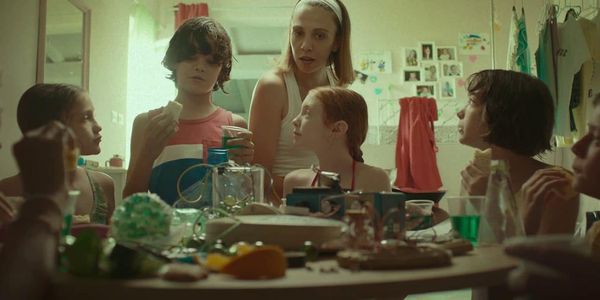Many filmmakers responsible for the recent resurgence of great Italian cinema on the world stage have all incorporated some form of fantasy to the stories. Some have been direct adaptations of fables like Matteo Garrone’s Tale of Tales or Pinocchio, while others have been religious allegories like Marco Bellocchio’s Blood of My Blood, and a third, like Alice Rohrwacher’s Happy as Lazzaro, employ magical realism and religious allegory. The D’Innocenzo Brothers’ latest movie Bad Tales (Italian title Favolacce) falls into a fourth category – suburban apocalypse – and is perhaps the bleakest and most confounding of all of these movies, for better and for worse.
A Strange Sense of Danger
There isn’t really a clear indication of what the fear within Favolacce is; it’s just a pure sense of impending peril. The movie is not much more than a string of sensations coursing through a small suburban town in Italy where family members and the community at large, start to experience a sort of metaphysical earthquake. Things begin to fall apart, anger erupts, people take wrong turns, and eventually, there is devastation. Two kids, Dennis (Tommaso di Cola) and Alessia (Giulietta Rebeggiani) are children of a couple with a strained marriage. They try to navigate the ill feelings that persist in their family but each attempt is met through the rapid fury of their father and timidity of their mother. They act up in different ways – the sister via crying and tantrums, the brother who is much more reserved explores his rumbling emotions via sexual experiences with a classmate named Ada and an older girl named Vilma (Ileana D’Ambra).

This movie is completely comprised of notions and thus, its technical aspects orchestrate most of what is going on the screen. A lot of tracking shots mixed with uneasy sound design insist on a continued collapse or falling down effect, but all of this is very mechanical and seems methodical and calculated directly to an end result that frankly doesn’t pay off. The main problem with Favolacce resides in the fact that there’s no weightage to this movie beyond its few sexually charged moments and perhaps the abusive beatings or yelling that happens once or twice. But even these feel like just detached sparks in a machine that keeps rolling along, hardly paying heed to any emotional investment in its characters of situations.
A Lack of Feeling
This is not to say that the movie is dead or sterile. It definitely does instill a sensation within it that keeps you on edge, but it feels a little cheap, like melodrama that vacuum sucks your tears out of your eyes. In this movie, we’re constantly waiting for something to happen because its constant and un-repenting tonal elements keep telling us it is. Eventually, we start to see real reveals, like a homemade bomb in a kid’s room. But the cutesy ambiguity of the movie’s core emotions, which can be surmised only vaguely as “troubling”, tease and taunt to no avail.
Many of the other characters engage in ‘doing things’ all of which seem to have no direction or purpose, only an urgency. It’s hard to recall singular scenes where any of these characters are fleshed out or even come to any sort of memorable emotional resonance that keeps them in mind as the movie descends into its bleak denouement. Even Dennis, whose sexually charged exploits which come as the most memorable scenes of the movie including drinking the breastmilk of a pregnant teen girl and having sex for the first time with his neighborhood friend, hardly makes an impact in and of himself.
Conclusion
Whatever commentary the film may want to make in regards to its clear generational rift – where children are both neglected, abused, and exploited emotionally by their parents – is only left wafting in the air as a mere “theme”. There’s no central thesis or idea within this movie to keep its vague notions focused like in say, Charles Burnett’s To Sleep with Anger, another suburban tale of malevolent disruption, where Harry (Danny Glover) acts as the movie’s orchestrator, to keep its magical realism and its distinct connection to the social and racial climate of its setting tethered to a central arc. Favolacce wants it both ways, to be considered important and clever without really saying nor investing in anything.
Favolacce is playing in select virtual cinemas in the U.S.
Watch Favolacce
Does content like this matter to you?
Become a Member and support film journalism. Unlock access to all of Film Inquiry`s great articles. Join a community of like-minded readers who are passionate about cinema - get access to our private members Network, give back to independent filmmakers, and more.